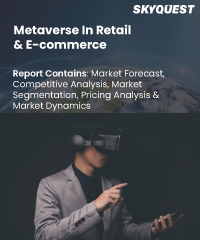
Product ID: SQMIG45M2007

Report ID:
SQMIG45M2007 |
Region:
Global |
Published Date: February, 2024
Pages:
157
|
Tables:
64 |
Figures:
75
Metaverse in Retail & E-commerce Market size was valued at USD 8.3 billion in 2019 and is poised to grow from USD 11.26 billion in 2023 to USD 128.99 billion by 2031, growing at a CAGR of 35.64% in the forecast period (2024-2031).
E-commerce (electronic commerce) is the purchase and sale of goods and services and the transmission of data and payments as well as the transmission of data and payments, via the internet. These are business transactions that take place from business to business (B2B), business to consumer (B2C), consumer to consumer (C2C), or consumer to business (C2B). There has been a constant separation between the physical and virtual worlds since technology first made it possible to buy products online. This was the situation until the development of the metaverse, a collection of interconnected technologies. This covers a range of innovations including augmented reality (AR), virtual reality (VR), non-fungible tokens (NFTs), and even video games. The ability to engage in several ways with digital objects, virtual worlds and real people makes the metaverse an immersive multi-user experience that anyone with access to it anywhere in the world can enjoy. The metaverse is all about 'customer experience,' which includes things like ‘stronger engagement’ and ‘greater knowledge of customers’.
According to a Shopkick survey, 70% of shoppers said that the chance to test, touch, and feel things is the most important part of an in-store experience. This will be resolved and fulfilled in the metaverse because AR and VR make it possible for you to do so in the comfort of your own home. The metaverse would be very beneficial for businesses since it would increase their customer base and provide them the chance to gather reviews on new items that would help them in the future. The metaverse can also bridge the gap between the physical and virtual worlds, combining online and offline commerce into one. This makes online buying more unique since users can simulate the physical world via the metaverse. No matter where they are, users will be able to purchase, sell, and trade goods and services in the metaverse, which will also give companies and creators more money. The metaverse is already being included into the platforms of many large e-commerce companies. Even clothing companies like Adidas and Gucci are looking into the metaverse. Online buying now feels more unique and individualized, which was unheard of before the metaverse. In the coming years, e-commerce in the metaverse will undoubtedly increase and develop. As new technologies are developed, new features appear that enable the blending of online and offline business.
Recent growth in interest in AR and VR makes it possible to check the fit and quality of a product before making a purchase. Normally, e-commerce systems work in a “browse, choose, click to buy" method. The metaverse will, however, transform this into "browse, experience, and buy." This signifies that customers using the metaverse can browse a store from the comfort of their homes, see product displays, and then make purchases. The metaverse has the potential to enhance and modernize present e-Commerce procedures while offering users a distinctive experience. The first advantage of e-commerce enabled by the metaverse will be "tailored experiences," which are currently frequently just product recommendations and discounts. Instead of being constrained by the limitations of the real world, marketers will be able to provide their customers with hyper-personalized "browse and buy" experiences in the metaverse. The second benefit might be referred to as "lower return rates" since the increased product visualization will assist users to make educated decisions and the metaverse-powered e-commerce will enable buyers to trial things before ordering or purchasing them. The third benefit is tailored experience the metaverse will offer will result in "greater conversion rates and higher upsell" for traffic/visitors landing on an e-Commerce site. According to recent surveys, consumers are willing to pay roughly 40% more for a product that can be examined in three dimensions. All of these accumulated advantages will ultimately lead to "improved profitability" for brands, altering how they run. In conclusion, the operating model, customer experience, sales, and profitability of e-commerce businesses can all be totally transformed by the metaverse.
US Metaverse in Retail & E-commerce market is poised to grow at a sustainable CAGR for the next forecast year.
Our industry expert will work with you to provide you with customized data in a short amount of time.
REQUEST FREE CUSTOMIZATIONMetaverse in Retail & E-commerce Market size was valued at USD 8.3 billion in 2019 and is poised to grow from USD 11.26 billion in 2023 to USD 128.99 billion by 2031, growing at a CAGR of 35.64% in the forecast period (2024-2031).
Want to customize this report? This report can be personalized according to your needs. Our analysts and industry experts will work directly with you to understand your requirements and provide you with customized data in a short amount of time. We offer $1000 worth of FREE customization at the time of purchase.

Product ID: SQMIG45M2007